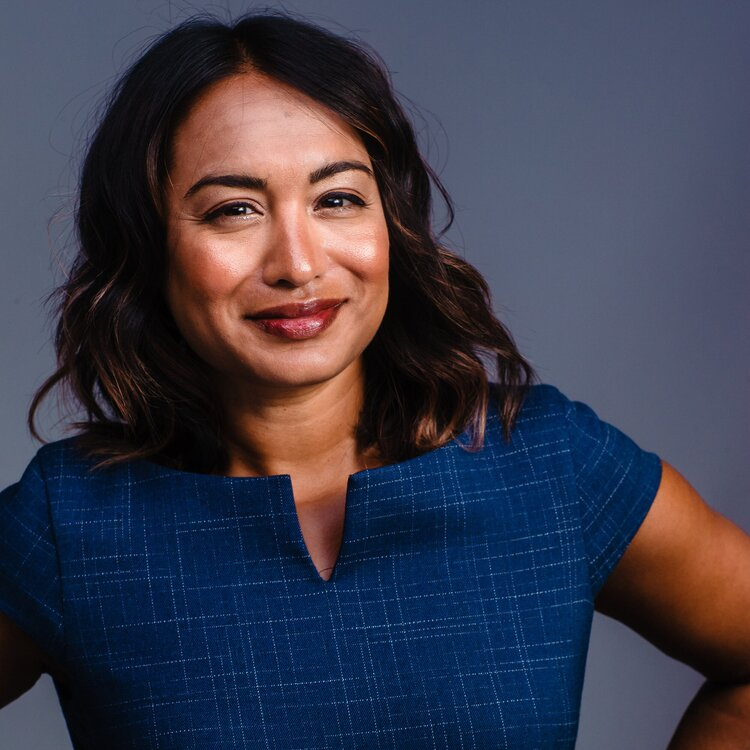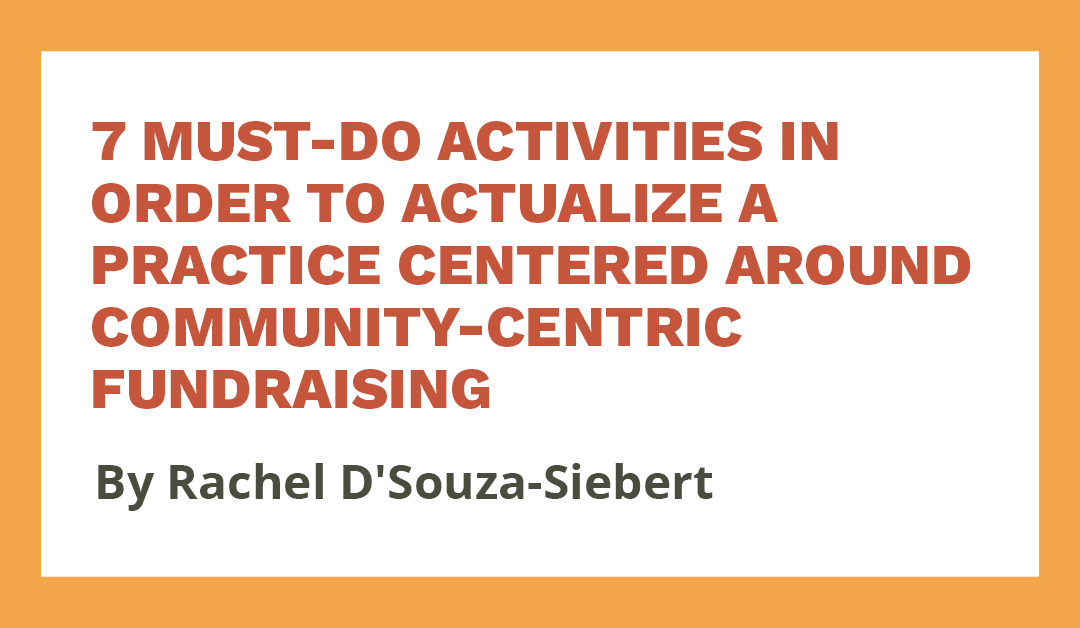By Rachel D’Souza, Founder + Principal, Gladiator Consulting, Justice Philanthropy Catalyst, Forward Through Ferguson
Over the summer of 2015, I found myself at a crossroads in my career. I was on maternity leave with my daughter and home with my 4-year-old son. It was during this personal transition period that my business, Gladiator Consulting, was born.
I wanted to find a way to infuse my personal commitment to racial justice and equity into my new role as a nonprofit consultant. I knew my point of view and skills could help justice-oriented organizations reach their full potential through fund development. I quickly found my niche working with grassroots and grasstops organizations in the start-up or initial capacity-building phase of their lifecycle.
I knew I needed to make a change — I was no longer willing to perpetuate racist fund development strategies in my work.
However, by 2017, I found myself faced with a company, much like my toddler, entering the terrible twos.
While there was no biting or kicking at Gladiator Consulting, it was a period marked by frustration, growing pains, and a few of my own meltdowns. And honestly, not that much was “different.”
It was just that, after two years working with justice-oriented organizations to raise money, using traditional donor-centric practices — things no longer felt right.
I had already spent a decade of my career in the nonprofit sector in various development roles, and I knew my way around a strong fund development program. But I increasingly became aware that the way I learned to raise money was centered on notions of whiteness and white supremacy culture.
I knew I needed to make a change — I was no longer willing to perpetuate racist fund development strategies in my work.
That spring, I read Vu Le’s blog on the principles of community-centric fundraising. While I found it inspiring, I was still struggling to understand how to integrate these ideas into my fundraising work.
Luckily, I attended Stanford Social Innovation Review’s Nonprofit Management Institute that fall where I heard Dorian Burton and Brian Barnes of TandemEd expound upon an article they’d co-authored earlier that year — Shifting Philanthropy from Charity to Justice. Their seven questions, along with Community-Centric Fundraising Principles, served as the framework for a shift in my fundraising practice.
These philosophies moved me beyond just the idea of anti-racist resource development and provided me the framework and inspiration to take action.
As I reflect on the last three years of successes and failures in actualizing a practice centered around community-centric fundraising, I identified some key activities that helped me get started. I hope they help you introduce this movement to your work.
1. Acknowledge where you internalize white supremacy culture
To transform yourself, your institution or a system, you must understand where you and your institution internalize or benefit from racism and white supremacy culture. This is hard. Even the most woke of us have much work to do.
As a non-Black person of color, I have had to get clear with myself about where I have benefitted from being an active participant in upholding racist and inequitable systems. When we understand where we’ve made mistakes in the past, we can actively choose to change our behaviors.
2. Operate based on core values/guiding principles
To be unclear is to be unkind. I wanted a crystal-clear set of values to guide my work and eventually settled on five. I know that I’m doing the right work when these values are explicit in our clients’ resource development efforts. Whether you ascribe to a personal set of core values or organize your efforts around the core values of your institution, you must be rooted in something that matters to you.
Here are my values. You can use them as an example.
- Social justice and racial equity — We believe that everyone deserves equal economic, political, and social rights and opportunities, and we believe in working towards a state in which outcomes are no longer predicted by race. We actively seek and prioritize serving clients who are committed to dismantling racist systems and addressing the root causes of inequity and injustice.
- Community — We believe that people affected by inequity and injustice are best positioned to develop strategies and determine solutions to overcome systemic oppression. We will strongly encourage our clients to put the voices of their constituents at the center of all decision-making processes. We will work with our clients to build protocols to ensure accountability to the community.
- Growth — We believe that leadership is a journey that requires continuous improvement, learning from failure, and adapting to an evolving environment. Our team is committed to our own professional development, and we expect that our clients are committed to theirs. We will work with our clients to prioritize growth and development for themselves and their teams.
- Audacity — We believe in a willingness to take bold risks and challenge the status quo. We will push clients to explore innovative solutions to old problems. We embrace failure as a key step in finding sustainable solutions. We intend to play a role in dismantling the nonprofit industrial complex.
- Imagination — We are resourceful, open-minded, and creative in pursuit of ingeniously elegant solutions. We find a strong balance between idealism and realism. We whole-heartedly envision and believe in a bright future for St. Louis.
3. Create space for learning, forgiving, and healing
You know you don’t have all the answers — so schedule time for learning. This does not mean you have to spend a fortune on membership organizations and fancy webinars or conferences. Start by picking a few newsletters to read or grab some books from the library. Listen to a podcast (like the Ethical Rainmaker!). Volunteer with another organization you’ve always been curious about.
And when your learning reveals that some past actions have not aged well, give yourself some grace. Apologize where you need to and share your learnings with others.
4. Leverage existing expertise
Community-centric fundraising doesn’t exist in a vacuum. You cannot do it alone. Joining this work is accepting that you are part of something bigger and better than just you. This means we share ideas, so invite your colleagues to a Zoom where you share fundraising ideas and strategies. Open your mind to the possibilities of unlikely, but necessary partnerships. Build and cultivate a network of relationships that you can share to enhance the fundraising muscles of peer organizations.
5. Embraces a nonlinear process
You are going to fail. And learn. And fail some more. You will mess up.
We are brought up in a system that teaches us we must get it right the first time. And if we don’t, there are few incentives to try again. We are taught to experience exhilarating success when something we tried yields a great benefit to our organization.
And, when we fail, well, you might be like me and momentarily consider leaving the field to return to your college of job folding sweaters at the mall.
But then you will remember that your best and highest value in this world is to keep trying. Inequitable systems have been around a looong time. We know how to be comfortable in them. It is important in this work to choose discomfort and take the incremental wins where we can get them. Every day.
6. Build your squad
Don’t worry — I am not suggesting you create another committee. Rather, be intentional about building relationships with those in and around your organization who will support a transformation towards community-centric fundraising ideals. Who believes in this work as much as you do? Who are the people who will help advance your community-centric fundraising agenda? What are the power dynamics in your institution? Who do you need to persuade? And, who will struggle with the principles of community-centric fundraising?
In addition to holding tight to the community-centric fundraising advocates, it is also important to hear and learn from ‘critical friends.’ This allows you to build your CCF muscles.
7. Pick a place and START
Movements don’t happen overnight — or in a month or year or even a decade. You likely won’t be able to implement a full articulation of Community-Centric Fundraising Principles soon, and you won’t realize the full impact of this movement for quite some time. This doesn’t mean you should wait. There isn’t going to be the perfect time, enough resources, or the strongest support for you and your organization to feel ready to try something that simply doesn’t happen around us.
But pick a place to start. Maybe you vet your ideas with a handful of institutional funders. Maybe you shift the focus of your recurring gifts, or maybe you stop doing events. Whatever it is, just start and believe that you’ll know more in the days, weeks, and years to come than you do now.
What have you learned on your CCF journey that would benefit this growing community? I would love to hear about your big successes and big failures.
End note: Rachel would like to express her gratitude to colleagues Natalie Self and Ann Fisher-Jackson who push her to shake imposter syndrome and take up space.

Rachel D'Souza
Rachel D’Souza (she/her) is the Founder+Principal of Gladiator Consulting in St. Louis, Missouri. Through Gladiator, Rachel has combined her knowledge of organizational culture and fund development with her deep personal commitment to centering community, seeking justice and creating belonging for those who have been disenfranchised or targeted by institutions, systems, and policy.
Born to parents who immigrated to the U.S. from India, Rachel has always been passionate about bridging differences and celebrating what’s possible when we collaborate from a mindset of abundance, learning, and risk-taking. Rachel loves cooking, snuggling her kids, and Instagram.
Discover more from CCF
Subscribe to get the latest posts sent to your email.

